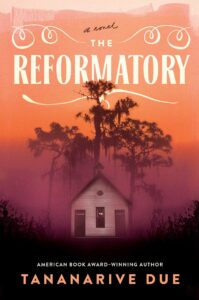
Every year, I read and review two or three horror novels, and every year, I start with a caveat about how I don’t usually read horror. That’s true, I don’t, but I do make exceptions, usually after a critical mass of word-of-mouth recommendations convince me that the book in question won’t lean too heavily on the aspects of horror that I don’t care for. Anyways, that’s my excuse for waiting so long to read The Reformatory by Tananarive Due, which is a tremendous book that I should’ve read last year and that should’ve won all the awards. Happily, it’s still making some decent progress—between my first draft of this review and its posting, it won the World Fantasy Award for Best Novel.
The Reformatory takes place in the swamps of North Florida during the Jim Crow era. The vast majority of the book is told from the perspective of two Black siblings living alone after the death of their mother and the false rape accusation that sent their union-organizing father fleeing to Chicago. But what would be a minor scuffle in a just world sends twelve year-old Robbie to the titular Reformatory, allegedly a place of reformation for troubled children, but carrying a well-earned reputation as a place of pain and often death. From that point, the book is split between Robbie trying to survive a place of cruelty and racism and no shortage of ghosts and his sister back at home trying to navigate a prejudiced legal system to get him free.
While this is marketed as a horror novel and has plenty of ghosts, The Reformatory is very much a novel where people are the real horror. In fact, the first comparison that comes to mind for me is Octavia Butler’s seminal novel Kindred. The latter is a time travel novel taking place during the days of slavery, whereas the former is set in Jim Crow and uses ghosts as its speculative element, but both have tight focuses on characters navigating very true-to-life horrors. Both feature fluid prose and seamless immersion that keeps the pages melting away quickly, and both are thematically heavy for very similar reasons.
The comparison to Kindred, which might be my favorite standalone novel of all-time, gives a pretty good impression of how highly I think of The Reformatory, and it also gives an impression of how I’d recommend it. I can’t speak much to its location within genre horror, but to sci-fi and fantasy readers like me who don’t often venture into horror, The Reformatory is still very much worth the read. If you liked Kindred, I expect you’ll like The Reformatory.
One problem with reviewing such an excellent book is that I end up repeating myself—the setting is great, the characters are great, the plot is great, etc. But it’s all true. Due brings Jim Crow to life in a vivid and well-rounded way, with a varied cast that truly runs the gamut. There are people loudly advocating for change, people who try to keep their head down to stay out of trouble, people who find comfort in religion and people jaded by it, lawyers and soldiers and musicians and politicians and a couple of closeted lesbians. There is at least one true sociopath, a few run-of-the-mill racists that see themselves as magnanimous, white people who want to help but are afraid to, and ones who truly do help. It’s set in a small town, but there are a lot of different people who bring that small town to life and make it feel truly real.
The characterization is similarly excellent. While neither main character has much opportunity to spend time focusing on any pursuits outside the main plot, the tight perspective thoroughly immerses the reader in their hopes, fears, and angers, and neither feels like they’re simply walking a predetermined track—each faces difficult choices and grasps true agency even in a world hellbent on taking away their power to act.
As for the plot? Well, let’s just say it continues my trend of having nothing to complain about. The story about navigating the legal system is gripping and well-structured. The story about surviving the reformatory is also gripping and well-structured. And the ghost story element provides enough uncertainty to keep the reader guessing about the shape of the resolution, unfolding slowly but ultimately driving toward a finish that brings each element together in a way that is thrilling and satisfying and at times heartbreaking. I read the last 190 pages in one sitting, and the people who recommended the book to me reported doing the same. The content may be hard to read, but it’s also a hard book to put down.
As you’ve gathered by this point of the review, I don’t really have any criticisms of The Reformatory. It pulled me in immediately with plot, character, and setting, and it never really let up. This is truly an all-timer, and I’m glad to see that it’s already picked up some genre awards. I only regret that I didn’t read it early enough to nominate it for a Hugo.
Recommended if you like: Jim Crow era historical fiction, horror grounded in the real world.
Can I use it for Bingo? It’s hard mode for Survival and Set in a Small Town, and it’s also by a POC Author and features Dreams.
Overall rating: 20 of Tar Vol’s 20. Five stars on Goodreads.
